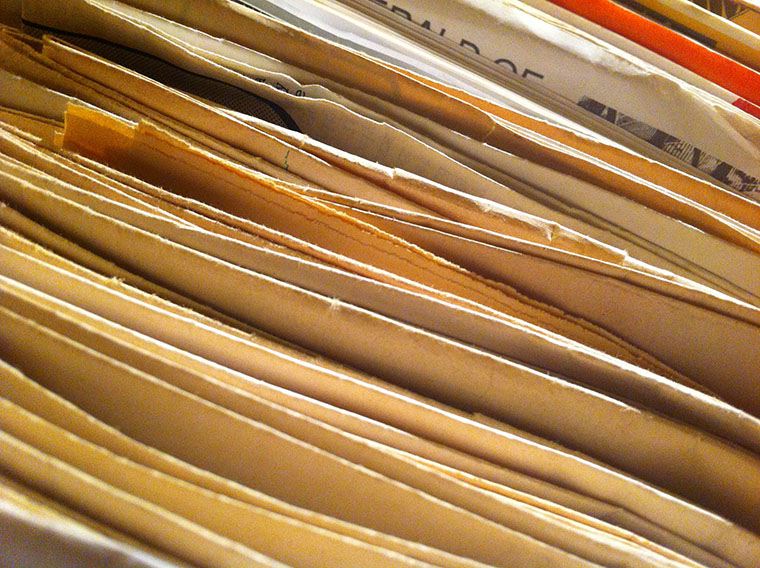I’ve been catching up with Mark Fisher’s latest collection and have been really struck by what he says about loss – or rather the loss of loss. I’m tempted to start banging on about Pogle’s Wood (a prime example of ‘fugitive evanescence’, in my life at least), but this sense of loss goes a lot further than TV programmes.
Like a lot of people I know, I’ve got 30 years of radical ephemera stored under my bed (see photo above). But these days if I want to dig something out, it’s usually quicker (and cleaner) to go straight to Google rather than sift through a dozen boxes full of dusty scraps of paper. And I think this has consequences – both in the material world (see the recent demise of schnews) and in the subjectivities we reproduce.
OK, I might be biased because I work in print design, but I think there’s still something special about the printed product: leaflets, flyers, magazines, newspapers, books…. Because these things are tangible objects, you have to engage with them in a quite different way from, say, something that falls into your inbox or pops up on your Facebook or Twitter. It might be a newspaper you bought, or a leaflet you picked up, or even an actual book in analogue format, but the way you relate to it will be qualitatively different from something that flashes across your smartphone. This shift in sensibility is, if anything, even more marked in music. In our house, I find that music is ‘on’ most of the time yet it’s the very opposite of the immersive experience I would have enjoyed thirty years ago. It starts to become seamless, muzak-like.
Here’s Fisher again, on a digital world where everything is always available, always on.
If anything is the signature of 21st century consumer culture, it is this feeling of a digitally upgraded normality – a perverse yet ultra-banal normality, from which all flaws have been erased.
Perhaps this links to a criticism a friend made of this blog. I’m paraphrasing but I think the gist was that our posts tend to be too crafted, too considered, too ‘perfect’. That threw me for a bit but I think what it means is this. The glossy interface of digital life doesn’t seem to leave room for mistakes, blemishes or stains. And it’s precisely those things which we need in order to get a purchase on something. The imperfections, the grubby in-between-places are where we can make our home. That’s where we find ourselves and find others.
How does all that relate to the stack of crap under my bed? Fisher once more:
Cultural time has folded back on itself, and the impression of linear development has given way to a strange simultaneity.
That idea of linear development was always a myth (as if A would always lead to B and then to C), but there was still a sense of history piling up under our beds, on our walls, in our bodies. The newspapers and flyers are dated, literally. But that’s what also gives them some power: they can take us back to different places, different times, different conditions and then let us work out some other route which doesn’t bring us back to this awful place. Compared to that, the Wayback Machine seems positively puny.
All of which is somewhat ironic as this post is just an excuse to stick up those Fisher quotes so I don’t lose them… Ah well, if it ain’t contradictory, it ain’t worth a fuck.


1 Comment